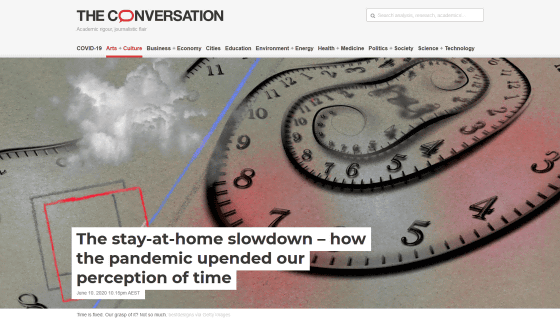'People's perception of time' is changing due to pandemic of new coronavirus

No matter what happens in the world or around us, the clock always moves at a constant speed, but the subjective speed experienced by individuals is not constant. 'The pandemic of the new coronavirus is changing people's perception of time,' said
The stay-at-home slowdown – how the pandemic upended our perception of time
https://theconversation.com/the-stay-at-home-slowdown-how-the-pandemic-upended-our-perception-of-time-139258

Many people think that 'a negative mood results in a slower experience time, and a positive mood
Gable points out that emotions and motives are intricately intertwined in human time perception. When people are excited, the 'approach motive' to challenge things becomes stronger, and when they are afraid of something, the 'avoidance motive' to escape from things becomes stronger.
In a 2016 (PDF file) study , Gable's research team showed that the stronger the approach motive, the faster the people's experience time, and the stronger the avoidance motive, the slower the experience time. It seems that this phenomenon is rational, for example, for those who are “enthusiastic about completing a puzzle”, they have a stronger approach motivation and experience less time, so they spend a longer time for their hobby. I can. On the other hand, those who are 'most likely to be hit by a car' have stronger avoidance motives and a longer experience time, so they can act quickly and escape from danger.

When a pandemic of the new coronavirus occurs in the United States, Mr. Gable may have stronger avoidance motives among Americans due to increased anxiety and uncertainty in daily life, and there may be a change in 'time perception' I thought it might be. It is difficult to clearly escape from the danger of a pandemic, and the situation that the risk of infection lurks in everyday activities such as shopping and exercise was an environment that could continuously cause avoidance motives.
So Gable's research team received a subsidy of 65,000 dollars (about 7 million yen) from the

In a survey of 1,000 Americans, about half said 'I felt that March 2020 was slower than usual.' One-quarter responded that 'the flow of time has not changed', and the remaining one-quarter responded that 'I felt that the time passed in March was fast.'
People's reported changes in experience time were strongly associated with people's emotions, and those who reported feeling tense or stressed during a pandemic were more likely to say that 'time passed slowly.' On the other hand, those who reported feeling happy or happy tended to reply that 'the time has elapsed faster.'
The survey also found that those who replied that 'the time has passed' tended to take action to maintain a social distance from others. While slower sensations may be an unpleasant side effect of anxiety and evasive behavior, Gable points out that the behavior of people who experience a time delay has benefited society.
In April, 10% of the total responded that 'the flow of time was slower and faster,' and many people reported feeling better. And, interestingly, it turns out that in April, the more people who report that they are 'feeling positive' and 'feeling the flow of time is faster', the more likely they are to take action to maintain a social distance. Gable thinks that his mood improvement and time perception changes may have stimulated his motivation for social distance behavior.

It's uncomfortable to slow down the flow of time during a pandemic, but focusing on exercise and hobbies, or just living a normal life, can help speed up the flow of time, Gable said. It was
Related Posts:
in Science, Posted by log1h_ik







